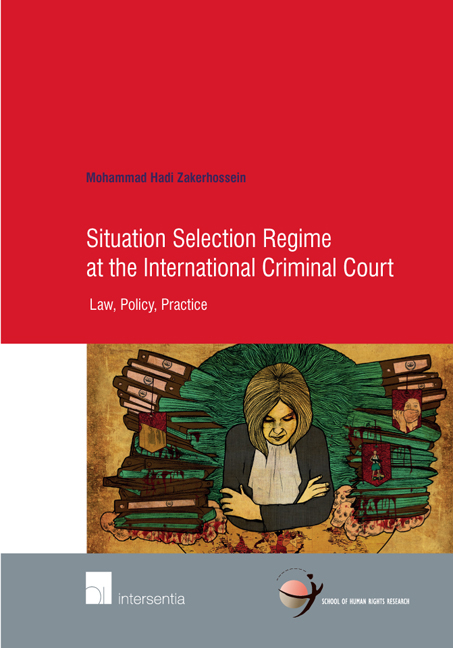Book contents
- Frontmatter
- Contents
- Acknowledgment
- Abbreviations
- General Introduction
- Part One Formulating the Concept of Situation in the Rome Statute Sense
- Part two Situation Selection Process
- Part three Situation Selection Criteria
- Part Four Situation Selection In Light Of Expressivism
- Chapter I Conceptualization of Expressivism in the Context of the ICC
- Chapter II Implications of Expressivism on the Situation Selection
- Conclusion
- Bibliography
- ICC Case Tables
- OTP Documents
- About the Author
- School of Human Rights Research Series
Chapter I - Conceptualization of Expressivism in the Context of the ICC
from Part Four - Situation Selection In Light Of Expressivism
Published online by Cambridge University Press: 13 October 2018
- Frontmatter
- Contents
- Acknowledgment
- Abbreviations
- General Introduction
- Part One Formulating the Concept of Situation in the Rome Statute Sense
- Part two Situation Selection Process
- Part three Situation Selection Criteria
- Part Four Situation Selection In Light Of Expressivism
- Chapter I Conceptualization of Expressivism in the Context of the ICC
- Chapter II Implications of Expressivism on the Situation Selection
- Conclusion
- Bibliography
- ICC Case Tables
- OTP Documents
- About the Author
- School of Human Rights Research Series
Summary
The ICC operates on a selective basis. The Court is not able to handle all situations and cases under its jurisdiction. More importantly, it is not intended to deal with all those situations and cases, because it is only a last resort mechanism, rather than a replacement to national jurisdictions. Combating international crimes is first an obligation upon States. In addition to its inability, the complementarity principle directs the Court to be hesitant to deal with all situations and cases. The permanency of the Court increases its excessive workload, and makes this organization more selective. Selectivity is a built-in feature of the Court that should be taken into account if someone wants to comprehend the Court well. All objectives, functions, mandates and structures of the Court should be understood in light of its selectivity. Selectivity is, indeed, a conceptual framework with normative implications. The Court was established on the backdrop of this major feature that may hurt its legitimacy and reputation. Therefore, the Court needs to operate under a theory that corresponds to its selectivity. Theories explain why a judicial system should be in place, given its abilities and inabilities. Given the arguments that will be put forward by this research, expressivism sounds like such a theory that fits the Court's selectivity. It gives expressive mandates to the Court.
The Court has been empowered with tools necessary to fulfil its expressive mandates, and to reduce the adverse effects of its selectivity. For instance, the concept of situation emerged to preserve the impartiality of the Court. The Court is not able to prosecute all cases, but it is not allowed to concentrate on the crimes committed by one side to a conflict. Therefore, the exercise of the Court's jurisdiction is situation-oriented. The preliminary examination is another crucial tool at the Court's disposal that helps this organization to decrease its selectivity and restrictions. Preliminary examination is a mechanism that expands the activities and authorities of the Court. In the case phase, the Prosecutor could address only one or a few actual cases, whereas she is able to deal with a more general context in the situational stage. The ICC Preliminary examination is a sui generis stage in the international criminal justice system.
- Type
- Chapter
- Information
- Situation Selection Regime at the International Criminal CourtLaw, Policy, Practice, pp. 371 - 388Publisher: IntersentiaPrint publication year: 2017

